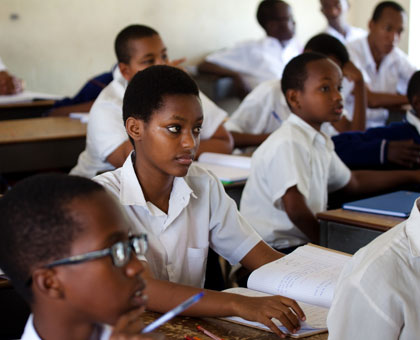The United Nations Educational and Scientific Organisation (Unesco) has commended Rwanda for its progress in reducing the number of out-of-school children since 2000.


The United Nations Educational and Scientific Organisation (Unesco) has commended Rwanda for its progress in reducing the number of out-of-school children since 2000.
Through the Education For All Global Monitoring report 2013/14, Unesco said among the ways the country has been able to cut down on out-of-school rate is by establishing special funds to ensure that orphans benefit equally from educational opportunities.
Rwanda’s education sector is also credited for working with development partners to provide predictable financial flows, which allows the implementation of free and compulsory education.
The report says between 2000 and 2010, the percentage of children who had never been to school was halved from 18 per cent.
The global report also recognised the country’s efforts in carrying out a major expansion of lower secondary schooling, with the gross enrolment ratio quadrupling in about 10 years to reach 47 per cent in 2011.
It linked the success to the extension of basic education from six to nine years in 2006, through to higher secondary level later on, and abolishing fees for the entire cycle and the removal of the obstacle of the primary completion examination in 2009.
Toward MDG
In a recent interview with The New Times, the State minister for Primary and Secondary Education, Dr Mathias Harebamungu, said Rwanda had achieved the Millennium Development Goals of gender parity in education at both primary and secondary levels.
"In our statistics, be it in primary or secondary education, the percentage of girls in schools is above 50 per cent. The net enrollment is about 98 per cent for girls which is quite an achievement not only by African standards but also globally,” Dr Harebamungu said.
Commenting on the report, Katherine Redman, the Unesco communications and advocacy specialist, said better tax management had also contributed to the country’s improvement in education funding with a 13 per cent share of tax revenue as a proportion of GDP as of 2011 being allocated to education.
"Rwanda increased the share of tax revenue for the education sector as a proportion of GDP from 10 per cent in 1998 to 13 per cent in 2011,” Redman said.
"The additional resources mobilised through better tax collection are equivalent to recovering the full value of the UK Department of International Development’s (DFID) 10-year support programme every three weeks. This helped raise expenditure per primary school child from $72 in 1999 to $81 in 2011.”
Teachers’ welfare
Redman also commended Rwanda for being mindful of teachers’ welfare by providing subsidised loans to trained teachers working in hard-to-reach areas and improving learning for the most marginalised children.
"The majority of teachers in such areas have participated in the programme, making a minimum monthly contribution of 5 per cent of their salary, with members allowed to borrow up to five times their savings,” she said.
However, Irina Bokova, the Unesco director, noted that the global chances of achieving universal primary education by 2015 were slim because aid to education had fallen.
Bokova said this called for the need to mobilise political will to ensure that more children had access to education.
"Combined with recent news that aid to education has fallen yet again, the lack of progress in reducing out-of-school numbers confirms our fears – there is no chance, whatsoever, that countries will reach the goal of universal primary education by 2015,” she said.


